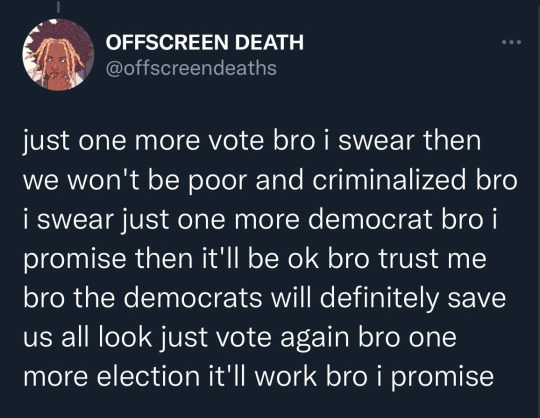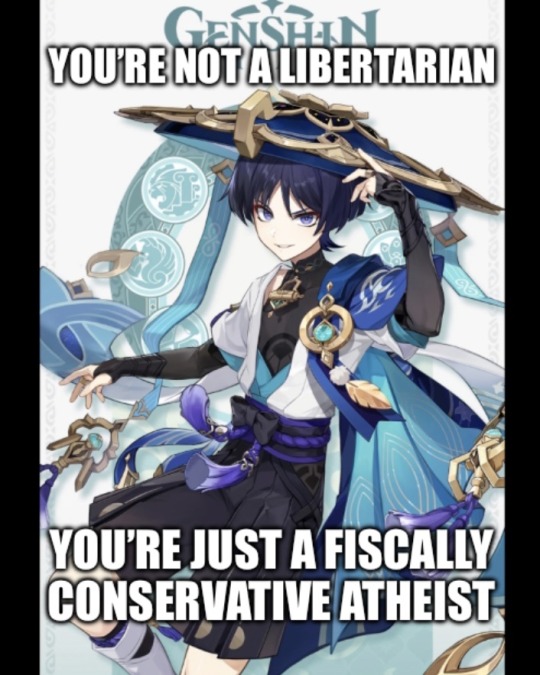#classical liberalism
Note
Why do economists need to shut up about mercantilism, as you alluded to in your post about Louis XIV's chief ministers?
In part due to their supposed intellectual descent from Adam Smith and the other classical economists, contemporary economists are pretty uniformly hostile to mercantilism, seeing it as a wrong-headed political economy that held back human progress until it was replaced by that best of all ideas: capitalism.

As a student of economic history and the history of political economy, I find that economists generally have a pretty poor understanding of what mercantilists actually believed and what economic policies they actually supported. In reality, a lot of the things that economists see as key advances in the creation of capitalism - the invention of the joint-stock company, the creation of financial markets, etc. - were all accomplishments of mercantiism.
Rather than the crude stereotype of mercantilists as a bunch of monetary weirdos who thought the secret to prosperity was the hoarding of precious metals, mercantilists were actually lazer-focused on economic development. The whole business about trying to achieve a positive balance of trade and financial liquidity and restraining wages was all a means to an end of economic development. Trade surpluses could be invested in manufacturing and shipping, gold reserves played an important role in deepening capital pools and thus increasing levels of investment at lower interest rates that could support larger-scale and more capital intensive enterprises, and so forth.
Indeed, the arch-sin of mercantilism in the eyes of classical and contemporary economists, their interference in free trade through tariffs, monopolies, and other interventions, was all directed at the overriding economic goal of climbing the value-added ladder.
Thus, England (and later Britain) put a tariff on foreign textiles and an export tax on raw wool and forbade the emigration of skilled workers (while supporting the immigration of skilled workers to England) and other mercantilist policies to move up from being exporters of raw wool (which meant that most of the profits from the higher value-added part of the industry went to Burgundy) to being exporters of cheap wool cloth to being exporters of more advanced textiles. Hell, even Adam Smith saw the logic of the Navigation Acts!

And this is what brings me to the most devastating critique of the standard economist narrative about mercantilism: the majority of the countries that successfully industrialized did so using mercantilist principles rather than laissez-faire principles:
When England became the first industrial economy, it did so under strict protectionist policies and only converted to free trade once it had gained enough of a technological and economic advantage over its competitors that it didn't need protectionism any more.
When the United States industrialized in the 19th century and transformed itself into the largest economy in the world, it did so from behind high tariff walls.
When Germany made itself the leading industrial power on the Continent, it did so by rejecting English free trade economics and having the state invest heavily in coal, steel, and railroads. Free trade was only for within the Zollverein, not with the outside world.
And as Dani Rodrik, Ha-Joon Chang, and others have pointed out, you see the same thing with Japan, South Korea, China...everywhere you look, you see protectionism as the means of achieving economic development, and then free trade only working for already-developed economies.
#political economy#mercantilism#economic development#early modern state-building#early modern period#laissez-faire#classical liberalism#classical economics#economics#economic history
57 notes
·
View notes
Text
Two notions of liberty revisited—or how to disentangle Liberty and Slavery
The modern liberal concept of liberty has roots in Roman law and the Roman understanding of the master and the slave. We need to unpick that heritage to imagine a better basis for our political aspirations.
David Graeber
May 19, 2013
Our idea of human freedom, with its origins in Roman law, is permeated through and through with the institution of slavery. But its links to slavery twisted the meaning of “freedom” from an empowering notion of what it is to live with dignity in a society of equals to one of mastery and control. Understanding the history of the concept should help us to regain the first and fight the second of those notions.
The meaning of the Roman word libertas changed dramatically over time. To be “free” meant, first and foremost, not to be a slave. Since slavery means above all else the annihilation of social ties and the ability to form them, freedom meant the capacity to make and maintain moral commitments to others. The English word “free,” for instance, is derived from a German root meaning “friend,” since to be free meant to be able to make friends, to keep promises, to live within a community of equals. Freed slaves in Rome became citizens—and this makes complete sense because to be free, by definition, meant to be anchored in a civic community, with all the rights and responsibilities that this entailed.
By the second century AD, however, this had begun to change. The jurists gradually redefined libertas until it became almost indistinguishable from the power of the master. It was the right to do absolutely anything, with the exception, again, of all those things one could not do. In the Digest, the basic text of Roman law, the definitions of freedom and slavery appear back to back:
Freedom is the natural faculty to do whatever one wishes that is not prevented by force or law. Slavery is an institution according to the law of nations whereby one person becomes private property (dominium) of another, contrary to nature.
Medieval commentators immediately noticed the problem here. But wouldn’t this mean that everyone is free? After all, even slaves are free to do absolutely anything they’re actually permitted to do. To say a slave is free (except insofar as he isn’t) is a bit like saying the earth is square (except insofar as it is round), or that the sun is blue (except insofar as it is yellow), or, again, that we have an absolute right to do anything we wish with our chainsaw (except those things that we can’t).
In fact, the definition introduces all sorts of complications. If freedom is natural, then surely slavery is unnatural, but if freedom and slavery are just matters of degree, then, logically, would not all restrictions on freedom be to some degree unnatural? Would not that imply that society, social rules, in fact even property rights, are unnatural as well? This is precisely what many Roman jurists did conclude—that is, when they did venture to comment on such abstract matters, which was only rarely. Originally, human beings lived in a state of nature where all things were held in common; it was war that first divided up the world, and the resultant “law of nations,” the common usages of mankind that regulate such matters as conquest, slavery, treaties, and borders, that was first responsible for inequalities of property as well.
This in turn meant that there was no intrinsic difference between private property and political power—at least, insofar as that power was based in violence. Dominium, a word derived from dominus, meaning “master,” or “slave-owner,” is the term in Roman law that means absolute private property. It is the sort of property-right that today has been theorised as the model case of a “negative freedom”—that which you can do with no interference from anyone else.
As time went on, Roman emperors also began claiming something like dominium, insisting that within their dominions, they had absolute freedom—in fact, that they were not bound by laws. At the same time, Roman society shifted from a republic of slave-holders to arrangements that increasingly resembled later feudal Europe, with magnates on their great estates surrounded by dependent peasants, debt servants, and an endless variety of slaves—with whom they could largely do as they pleased. The barbarian invasions that overthrew the empire merely formalized the situation, largely eliminating chattel slavery, but at the same time introducing the notion that the noble classes were descendants of the Germanic conquerors, and that the common people were inherently subservient.
Still, even in this new Medieval world, the old Roman concept of freedom remained. Freedom was simply power. When Medieval political theorists spoke of “liberty,” they were normally referring to a lord’s right to do whatever he wanted within his own domains—his dominium. This was, again, usually assumed to be not something originally established by agreement, but a mere fact of conquest: one famous English legend holds that when, around 1290, King Edward I asked his lords to produce documents to demonstrate by what right they held their franchises (or “liberties”), the Earl Warenne presented the king only with his rusty is sword. Like Roman dominium, it was less a right than a power, and a power exercised first and foremost over people—which is why in the Middle Ages it was common to speak of the “liberty of the gallows,” meaning a lord’s right to maintain his own private place of execution.
By the time Roman law began to be recovered and modernized in the twelfth century, the term dominium posed a particular problem, since, in ordinary church Latin of the time, it had come to be used equally for “lordship” and “private property.” Medieval jurists spent a great deal of time and argument establishing whether there was indeed a difference between the two. It was a particularly thorny problem because, if property rights really were, as the Digest insisted, a form of absolute power, it was very difficult to see how anyone could have it but a king—or even, for certain jurists, God.
This genealogy of liberty allows us to understand precisely how Liberals like Adam Smith were able to imagine the world the way they did. This is a tradition that assumes that liberty is essentially the right to do what one likes with one’s own property. In fact, not only does it make property a right, it treats rights themselves as a form of property. In a way, this is the greatest paradox of all. We are so used to the idea of “having” rights—that rights are something one can possess—that we rarely think about what this might actually mean. In fact (as Medieval jurists were well aware), one man’s right is simply another’s obligation. My right to free speech is others’ obligation not to punish me for speaking; my right to a trial by a jury of my peers is the responsibility of the government to maintain a system of jury duty. The problem is just the same as it was with property rights: when we are talking about obligations owed by everyone in the entire world, it’s difficult to think about it that way. It’s much easier to speak of “having” rights and freedoms. Still, if freedom is basically our right to own things, or to treat things as if we own them, then what would it mean to “own” a freedom—wouldn’t it have to mean that our right to own property is itself a form of property? That does seem unnecessarily convoluted. What possible reason would one have to want to define it this way?
Historically, there is a simple—if somewhat disturbing—answer to this. Those who have argued that we are the natural owners of our rights and liberties have been mainly interested in asserting that we should be free to give them away, or even to sell them.
Modern ideas of rights and liberties are derived from what came to be known as “natural rights theory”—from the time when Jean Gerson, Rector of the University of Paris, began to lay them out around 1400, building on Roman law concepts. As Richard Tuck, the premier historian of such ideas, has long noted, it is one of the great ironies of history that this was always a body of theory embraced not by the progressives of that time, but by conservatives. “‘For a Gersonian, liberty was property and could be exchanged in the same Way and in the same terms as any other property’—sold, swapped, loaned, or otherwise voluntarily surrendered.” It followed that there could be nothing intrinsically wrong with, say, debt peonage, or even slavery. And this is exactly what natural-rights theorists came to assert. In fact, over the next centuries, these ideas came to be developed above all in Antwerp and Lisbon, cities at the very center of the emerging slave trade. After all, they argued, we don’t really know what’s going on in the lands behind places like Calabar, from which so many men and women were being enslaved and shipped to the Americas, but there is no intrinsic reason to assume that the vast majority of the human cargo conveyed to European ships had not sold themselves, or been disposed of by their legal guardians, or lost their liberty in some other perfectly legitimate fashion. No doubt some had not, but abuses will exist in any system. The important thing was that there was nothing inherently unnatural or illegitimate about the idea that freedom could be sold.
Before long, similar arguments came to be employed to justify the absolute power of the state. Thomas Hobbes was the first to really develop this argument in the seventeenth century, but it soon became commonplace. Government was essentially a contract, a kind of business arrangement, whereby citizens had voluntarily given up some of their natural liberties to the sovereign. Finally, similar ideas have become the basis of that most basic, dominant institution of our present economic life: wage labor, which is, effectively, the renting of our freedom in the same way that slavery can be conceived as its sale.
It’s not only our freedoms that we own; the same logic has come to be applied even to our own bodies, which are treated, in such formulations, as really no different than houses, cars, or furniture. We own ourselves, therefore outsiders have no right to trespass on us.
This might seem an innocuous, even a positive notion, but it looks rather different when we take into consideration the Roman tradition of property on which it is based. To say that we own ourselves is, oddly enough, to cast ourselves as both master and slave simultaneously. “We” are both owners (exerting absolute power over our property), and yet somehow, at the same time, the things being owned (being the object of absolute power).
The ancient Roman household, far from having been forgotten in the mists of history, is preserved in our most basic conception of ourselves—and, once again, just as in property law, the result is so strangely incoherent that it spins off into endless paradoxes the moment one tries to figure out what it would actually mean in practice. Just as lawyers have spent a thousand years trying to make sense of Roman property concepts, so have philosophers spent centuries trying to understand how it could be possible for us to have a relation of domination over ourselves. The most popular solution—to say that each of us has something called a “mind” and that this is completely separate from something else, which we can call “the body,” and that the first thing holds natural dominion over the second—flies in the face of just about everything we now know about cognitive science. It’s obviously untrue, but we continue to hold onto it anyway, for the simple reason that none of our everyday assumptions about property, law, and freedom would make any sense without it.
To understand the history and, ultimately, incoherence of the notions of liberty grounded in Roman notions of dominion is to potentially free ourselves to re-imagine liberty. For example, to recognise the forgotten “obligations owed everyone in the entire world” inherent in our freedoms; but also to resurrect the older notion of liberty as the state achieved by citizens acting together in determination of a common good.
#repost of someone else’s content#graeber#history#ancient Rome#medieval Europe#slavery#mind-body dualism#racism#antiblackness#liberals#liberalism#classical liberalism#capitalism#private property#social contract#natural rights#consent of the governed#anarchism
48 notes
·
View notes
Text
By: Michael Shermer
Published: Mar 3, 2024
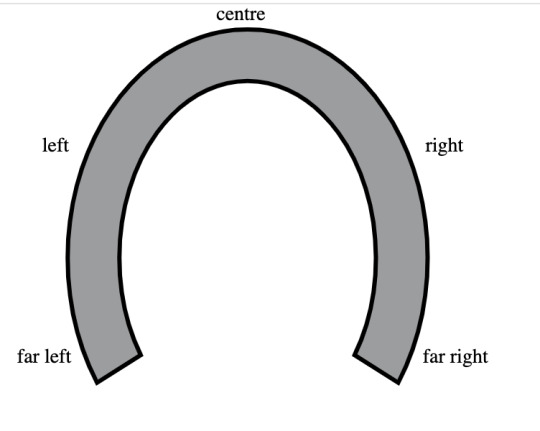
It was an X post (tweet) mostly out of frustration after wasting too much time on social media absorbing endless stories about the Rigid Right and the Loony Left that led me on February 23 to exclaim…
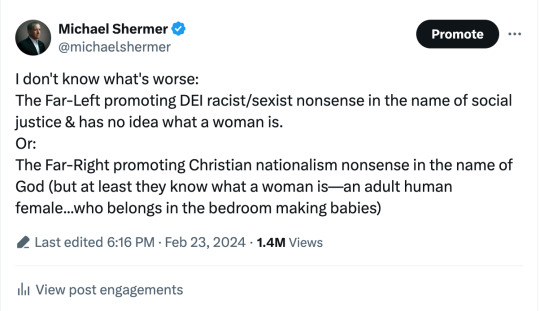
The thousands of responses were as predictable as they were confident in their assertion that one side of the political spectrum is unquestionably worse than the other. A short sampling (see all responses here):

My post is suggestive of the Horseshoe Theory of politics, according to which if you take a linear spectrum from Left to Right and bend it into a horseshoe shape, the extreme ends are not so far apart (see graphic above).
The type specimen for the Horseshoe Theory was the 1939 Nazi-Soviet non-aggression pact that resulted in the joint invasion of Poland that launched World War II, and was famously broken by Hitler when he invaded Russia two years later, in part, because he detested Communism (which he also equated with Jews), plus he wanted lebensraum (living space), thought of the Russian hun as a lesser breed, needed their natural resources, was a proponent of blood-and-soil romanticism, and more (so his motivations are probably overdetermined). The theory has been applied and criticized ever since, for example here and here. But it very much depends on what issues are being compared and, to be frank, whose ox is being gored by the theory (few on either extreme see themselves as remotely like the extremists on the other pole). Well, then, what would critics prefer, the equally delimiting straight spectrum like this? Where would you put someone like me who is socially liberal but fiscally conservative?
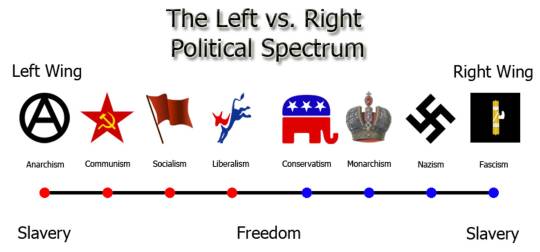
For my political tastes I prefer something like the 2x2 matrix below with the primary dimensions being Liberty (Economic or Personal) and Security (Economic or Personal), in which extremes on the Security variable once again find Communists and Fascists cheek-by-jowl. (I’m in the upper quadrant around Classical Liberalism—more on this below.)
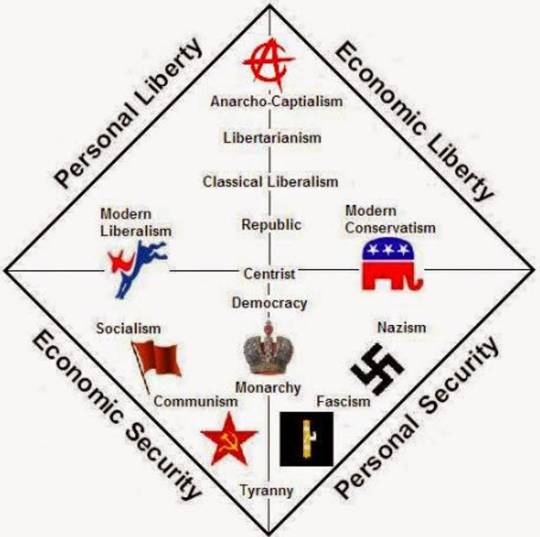
One of my respondents posted in the comments this helpful checklist with updated examples for current events:

Since I started this Skeptic Substack column in 2021, I have been highly critical of the Far-Left’s woke ideology that has led them to abandon the search for objective truth; to treat science as nothing more than a hegemonic Western colonial capitalist tool of power and domination; to give up on Martin Luther King Jr.’s dream of judging people by the content of their character, and instead obsess over the color of their skin by implementing DEI (Diversity, Equity, Inclusion) programs that force otherwise liberal, tolerant, color-blind people into elevating race above character; to punish anyone who deviates from Far Left norms (created only recently and constantly changing) through any means necessary, from censorship and cancel culture to loss of employment and life ruination; and to redefine biological sex from the long-accepted definition of gamete size/type to whatever anyone says it is, and along with this delusion to discard a century of hard-earned women’s rights to privacy (bathrooms), to female-only spaces (changing rooms, prisons), to female-only sports (swimming, cycling, volleyball), and more generally to ditch the dignity of being a woman. (See my Skeptic columns critical of the Far Left here, here, here, here, here, and here.)
As I said in my X post, at least the Far-Right knows what a woman is—an adult human female…who belongs in the bedroom making babies. The SCOTUS overturning of Roe v. Wade was, as I predicted at the time, only the start of the Far-Right’s plan to take control of women’s reproductive rights, starting with abortion. (See my three-part series defending the pro-choice position here, here, and here. And additional columns critical of the Right, such as here, here, and here.) It was only a matter of time before the Far-Right would target IVF, and that time has come with the Alabama State Supreme Court declaration that all frozen embryos stored for InVitroFertilization are legal persons, and thus the disposal of unused frozen embryos should be considered murder. Predictably, IVF clinics began closing their doors, and in the process deprive couples of this life-giving technology. Here are a couple of my outraged tweets on the matter:


I don’t think many Republicans on the Far Right even know what IVF entails. It is quite invasive, risky, time consuming, expensive, and not guaranteed to work. To prep the body for the process hormone shots must be self-administered for weeks in order to produce extra eggs. Withdrawing the eggs is a form of surgery requiring general anesthesia. After withdrawal they are then fertilized (after we guys make our, um, “contribution” to the process) and then implanted. At least half of all implanted fertilized eggs fail to result in a viable birth, so many couples have multiple fertilized eggs implanted in hopes of having one viable birth (and thus some have twins or triplets), with the rest frozen for future use if all else fails, which is as often the case as not. By treating these frozen embryos as “persons”, if couples don’t want to have half a dozen kids or more, then they (and by “they” I mean the women) would have to go through the painful, stressful, expensive, and time consuming process over and over again in hopes of success. Are conservatives willing to foot the bill for the tens of thousands of dollars for each round in order to “save” the frozen persons?
How ignorant and uninformed are Republicans when it comes to reproductive technology? Here is Alabama Republican Senator Tommy Tuberville when asked his opinion of his state’s Supreme Court decision:
Yeah, I was all for it. You just gotta look at everything going on in the country. It’s just an attack on families, an attack on kids. You know, anything we can do for the future of our young people, because they’re our number one commodity. We need to have more kids, we need to have an opportunity to do that, and I thought this was the right thing to do.
The NBC News reporter was understandably dumbfounded by the Senator’s ignorance. “But IVF is used to have more children, and right now IVF services are paused at some of the clinics in Alabama,” she explained to the now-flummoxed law-maker. “Aren’t you concerned that this could impact people who are trying to have kids?”
Now stumped, and aware of his own lack of knowledge of what IVF is, exactly, Tuberville stuttered out a change of topic: “Well, that’s for another conversation. I think the big thing is right now you protect, you go back to the situation and you try to work it out to where it’s best for everybody. That’s what the whole abortion issue is about.” Uh, no it isn’t Senator.
In fact, IVF enables around 500,000 babies to be born every year worldwide, with an estimated 10 million total since the technology came online. You would think baby-loving pro-natalist conservatives would be all for this technology. But no. This led me to tweet out that the GOP was once again the POS—the Party of Stupid (a descriptor coined by GOP Presidential candidate Bobby Jindal)—and (channelling Monty Python) predicting what may be coming next for the Religious Right:
Every sperm is sacred. / Every sperm is great.
If a sperm is wasted, / God gets quite irate.
Let the heathens spill theirs, / On the dusty ground.
God shall make them pay for / Each sperm that can't be found.
Let the Pagans spill theirs / O'er mountain, hill, and plain.
God shall strike them down for / Each sperm that's spilt in vain.
As for contraception, apparently this technology leads to “recreational sex,” and for conservatives that’s a bridge too far. As if living up to H. L. Mencken’s definition of a Puritan—"the haunting fear that someone, somewhere, might be happy"—the conservative Heritage Foundation posted on X that “Conservatives have to lead the way in restoring sex to its true purpose, & ending recreational sex & senseless use of birth control pills.” In support they quoted British writer Mary Harrington, who advocates against the birth control pill and in favor of “rewilding sex, returning the danger to sex, returning the intimacy and, really, the consequentiality to sex.” So…conservatives only have sex for reproductive purposes? Sure. The hypocrisy begs for comedic commentary, as in Bill Maher’s observation of pro-life politicians who arrange abortions for their mistresses, or George Carlin’s assessment of conservatives who pretend to care deeply for the “unborn”, but once you’re born…
You’re on your own. No nothing. No neonatal care, no daycare, no head start, no school lunch, no food stamps, no welfare, no nothing. If you're pre-born, you're fine. If you're preschool, you're fucked. Conservatives don't give a shit about you… until you reach military age. Then they think you are just fine, just what they’ve been looking for. They’re not pro-life. They’re anti-woman. They believe a woman's primary role is to function as a broodmare for the state.
In response to my X post comment (below) that IVF is just the start, right-wing activist and author Christopher Rufo responded:
“Recreational sex” is a large part of the reason we have so many single-mother households, which drives poverty, crime, and dysfunction. The point of sex is to create children—this is natural, normal, and good.”

Here was my response to Rufo:
Recreational skiing, softball, soccer, tennis...is a big reason we have so many sports injuries @realchrisrufo ! Recreational sex is not the cause of single-mother households. It is LACK of birth control use + lack of education & norms of commitment, marriage, responsibility, etc. Conservatives are right to emphasize family values. Wrong to restrict freedom & choice for others. IVF & frozen embryos have given > 8 million babies life. Why would you want to deprive parents of this life-giving technology that results in endless parental love? (I speak from personal experience.) Egg retrieval, fertilization, hormone prep, embryo implantation, not to mention pregnancy itself, is a HUGE commitment, mainly born by women (we men just have to, uh, make a "contribution" in a cup) Freezing embryos is necessary because the process is very hard on women, expensive, & many first-tries fail. I don't believe that conservatives really believe that a frozen embryo is a person. I think it's part of a larger religious/political agenda to control women's reproductive choice and freedom. Restricting choice and freedom should not be a conservative value, but it has become one.
An even more extreme position on these matters (if such a thing is even possible) was that of Daily Wire conservative commentator Michael Knowles, who opined that…
The reason surrogacy and IVF are immoral is because they interfere with the family, they break up the nucleus, the very building block of society. They separate the reproductive from the conjugal act. The problem for IVF and surrogacy is that no ends, no matter how good, justify immoral means. No ends, no matter how good, justify actions that are intrinsically evil to achieve them. This is the same kind of logic that we would apply to, say, rape. A child who is conceived in rape. I know some. They have a right to life. It’s very good that they exist. We like these people.
This was a bridge too far, even for me, and so I cut loose on Knowles’ despicable, detestable, disgraceful statement:

As I assess matters here in 2024, the Rigid Right and the Loony Left are both manifestations of authoritarianism—specifically, the well-researched and documented (mostly by liberal social scientists) Right-Wing Authoritarianism, but the newly documented (mostly by conservative social scientists—what few there are) Left-Wing Authoritarianism that is equally divisive and destructive. In response, I would like to make the case for Classical Liberalism. To wit:
Like most liberals, I am pro-choice and fully support women’s reproductive and economic rights; I am in favor of free speech and free thought; I believe in the separation of church and state and am against prayer in school; I believe in liberal democracy and voter’s rights; I believe in some gun control measures; I support environmental protection laws and agree that global warming is real, human caused, and something we should work toward mitigating; I work toward reducing animal suffering and expanding animal rights; I think that we need judicial reform because of our broken criminal justice system that incarcerates far too many people for victimless crimes, especially people of color; I think we should legalize all drugs and regulate them like tobacco and alcohol; I believe we have a moral obligation to help those who cannot help themselves; and, of course, I hold that science is the best tool ever devised for understanding the world and changing it for the better.
Like most conservatives, I believe in limited and accountable government, along with low taxes, low spending, and a balanced budget; I believe in the Constitution and the rule of law along with our system of Constitutional republicanism with checks and balances to prevent power from accruing to any one person or agency; I believe in property rights, and that one of the primary functions of government is to protect our rights; I believe in individual liberty, personal responsibility, and the philosophy of individualism in contrast with collectivism and identity politics; I contend that free trade and free markets are by far and away the best economic system for wealth production and lifting people out of poverty; I believe that there are objective moral values that apply to most people in most places most of the time (although I do not believe they were derived from God) and I reject moral relativism in all its forms.
Most of all, I agree with John Stuart Mill’s timeless observation (in his 1859 book On Liberty) that: “A party of order or stability, and a party of progress or reform, are both necessary elements of a healthy state of political life.”
In the run-up to the forthcoming Presidential election between Donald Trump and Joe Biden it doesn’t appear either extreme form of authoritarianism is going to attenuate any time soon. Out of a population of nearly 260 million adult Americans, these two are the best in show? What we need is a uniting President in the mold of Abraham Lincoln who, in his First Inaugural Address, as the country was about to be split asunder in civil war, nevertheless addressed all Americans when he thundered both descriptively and prescriptively:
We are not enemies, but friends. We must not be enemies. Though passion may have strained it must not break our bonds of affection. The mystic chords of memory, stretching from every battlefield and patriot grave to every living heart and hearthstone all over this broad land, will yet swell the chorus of the Union, when again touched, as surely they will be, by the better angels of our nature.
#Michael Shermer#horseshoe theory#horseshoe politics#IVF#in vitro fertilization#reproductive freedom#authoritarianism#liberalism#centrism#loony left#rigid right#far left#far right#classical liberalism#religion is a mental illness
8 notes
·
View notes
Text
Short description
I’m in my late teens
I am half Taiwanese half white (I’m a pale POC we exist)
I love political compass memes
I am neurodivergent and autistic. Yes I can reclaim the r word. I’m autistic and I’ve been calling the r word and treated like one behind my back
I am learning Mandarin and only know limited Japanese. I learned Japanese before but forgot a lot and my Mandarin is now way better than my Japanese.
I’m a female (she/her) and I’m straight. Not LGBT, no problem with LGBT though. I support LGBT rights
If you’re a jerk, I’m gonna block you. I don’t block people just for disagreeing with me but I will block you if you are a Karen.
No I’m not a terf. Trans women aren’t men, THEY 👏ARE 👏 JUST TRANS WOMEN (visa versa for trans men too)
I’m a politically confused centrist. Some fringe radicals want to pideonhole me as conservative or a liberal but I’m not either maybe I’m right leaning or just a moderate liberal without knowing but idk that’s for me to figure out and I’m not going pretend to be one just to appease some of you assholes. 😘🖕Same way I’m not going pretend I’m full white or full Asian.
I used to be Republican but now I realized a lot of Republicans/conservatives are full of 💩 too
#centrism#asian pride#about me#conservative#classical liberalism#political compass memes#political compass#truscum#transmed#liberal
19 notes
·
View notes
Text
actually the LGBTQIA community is not safe for lots of queer people.
I appreciate folks who want to post things like "actually bi people are part of the quiltbag" and so forth but
no. that is not the case. it hasn't been since before the "GL" was first coined.
Bisexual people, trans people, ace people, have not been welcome in the dworkin bookstore, ever.
I get that so many of you are too young to know how all this played out. I don't blame you for the feelings I get smacked with when LIAEGHULJKHAEGLKJBHG is used as a synonym for queer, or "community" is defined as a circular railroad of internet posts.
I wish I could be nicer and more inviting about it but tumblr specifically has made a decade project out of punishing older queers for not being dead yet & failing to support the qwerty police. I'm not nice about it, but I would be honest! hypothetically, in a fantasy scenario where any of you color-guard officers were actually motivated by the values you espouse.
8 notes
·
View notes
Text
youtube
Watching This Video from Renegade Cut, and there's a certain extent to which I feel "neoliberalism" and "classical liberalism" are primarily propaganda terms.
Like: all those words mean in practical terms is "Conservative". "Classical liberal" subtly implies that markets, property, and hierarchy(disguised as "competition") -NOT egalitarianism, human rights, and rule of law- are the oldest and most fundamental aspects of liberalism, and Neoliberalism presents itself as a "New" form of liberalism... where markets, property, and hierarchy-under-the-mask-of-"competition" are given primacy over egalitarianism, human rights, and the rule of law. Conservatism, meanwhile, is a political movement which broke away from liberalism during the French Revolution because... they saw it as an example of how egalitarianism and democracy could threaten property, hierarchy, and markets, and they didn't like that. Like: when someone calls themselves a "classical liberal", what they typically mean is that they'd rather see a corporation make 1% extra profit than see the shared humanity of those it employs respected by the State, and that's just a statement of conservative principles.
Anyway just something I started thinking watching this essay that I wanted to share. This essay does a great job of expressing how ~Competition~ acted as a stalking-horse for private-tyranny via labor-abuse and monopoly in 1990s United States political discourse.
#Renegade Cut#Neoliberalism#Classical Liberalism#Conservatism#Politics#Political Philosophy#Rhetoric#US History#Radio#Monopoly#Bill Clinton#informative reblogs#zA's Inveterate Politicism#zA's Endemic Historicism#zA Opinions#Youtube
6 notes
·
View notes
Text

#rousseau#jean jacques rousseau#general will#social contract#philosophy#political philosophy#philosophy memes#the social contract#discourse on political economy#civic nationalism#classical liberalism
7 notes
·
View notes
Text
Ambidextrous
Some people are left-handed;
some people are right-handed.
I happen to be ambidextrous,
but what sets me apart
is that I will not use either hand
to force yours.
#leftism#rightism#both sides are dumb#politics#libertarian#libertarianism#classical liberalism#liberalism#liberty
2 notes
·
View notes
Text
“Also, political thinkers of the Enlightenment who were the pioneers of classical Liberalism in the 19th century denied metaphysics and the soul and so their ideas have nothing to do with the natural law taught by the Church. Their ideas also deny the influence of objective truth and God on human conduct. They follow Kant’s definition of freedom which views freedom as lack of external constraint and all law having its origin in the self. Since there are no essences which are not the result of the subjective imposition of man, there is no standard by which to judge or limit freedom. Marx denies natural right and gives complete authority to the collective which views a human being as a product of impersonal, materialist forces which govern history.”
- Fr. Brian Mullady OP, Christian Social Order
#Catholic#Christianity#quotes#Fr. Brian Mullady#Christian Social Order#111#classical liberalism#enlightenment#marxism
2 notes
·
View notes
Text
I love you people going into "useless" fields I love you classics majors I love you cultural studies majors I love you comparative literature majors I love you film studies majors I love you near eastern religions majors I love you Greek, Latin, and Hebrew majors I love you ethnic studies I love you people going into any and all small field that isn't considered lucrative in our rotting capitalist society please never stop keeping the sacred flame of knowledge for the sake of knowledge and understanding humanity and not merely for the sake of money alive
#classics#mythology#ancient greek mythology#ancient roman mythology#comparative literature#latin#hebrew#ethnic studies#fuck capitalism#communism#i love my useless degree idc#academia#university#dark academia#Greek#philosophy#liberal arts#humanities#women and gender studies#cultural anthropology
37K notes
·
View notes
Text

A chart with many lessons.
#geolibertarianism#georgist#henry george#political#politics#classic horror#classic sci fi#classic science fiction#classics#semantics#capitalism#latam#milei#bolsonaro#classical liberalism#libertarianism#conservatism#neoliberal capitalism#neoliberalism#brasil#brazil#paraguay#guarani
1 note
·
View note
Text


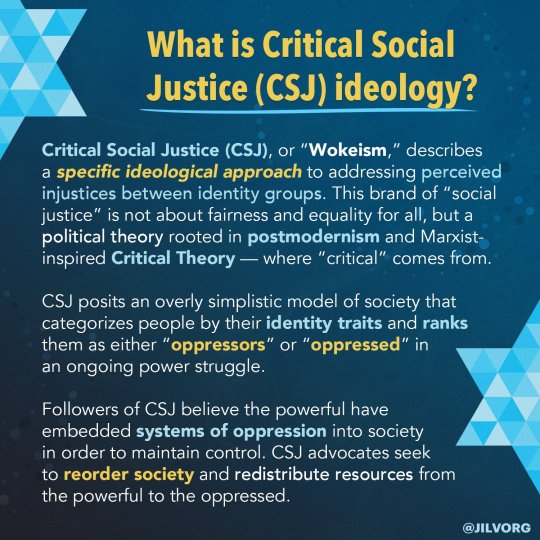
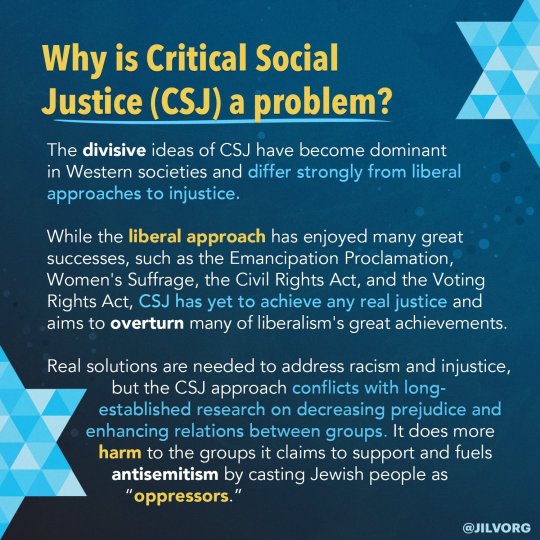

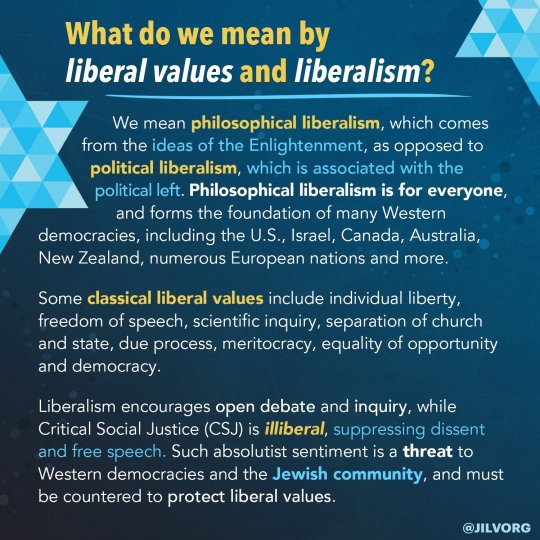
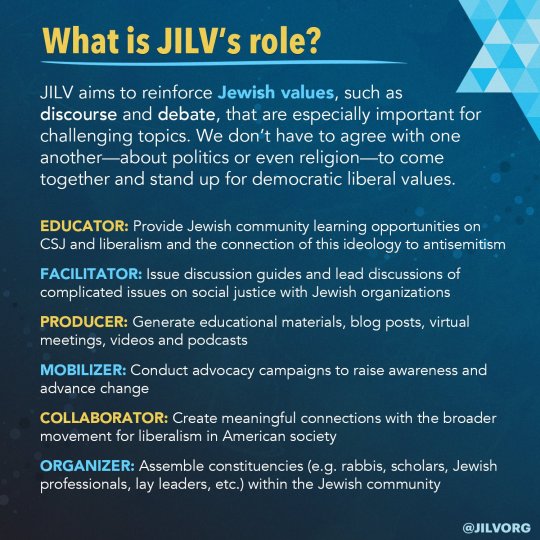

#Jewish Institute for Liberal Values#liberalism#liberal values#philosophical liberalism#classical liberalism#liberal ethics#critical social justice#wokeness#wokeness as religion#cult of woke#wokeism#woke#oppressor#oppressed#intersectionality#religion is a mental illness
5 notes
·
View notes
Text
ideology traps your mind. Truth creates freedom
#politics#classical liberalism#conservativism#fascisim#liberalism#democracy#democrats#nationalism#communism#socialism#capitalism
0 notes
Text
Well folks, it's been nice being a druid. But I need to face my true god now.
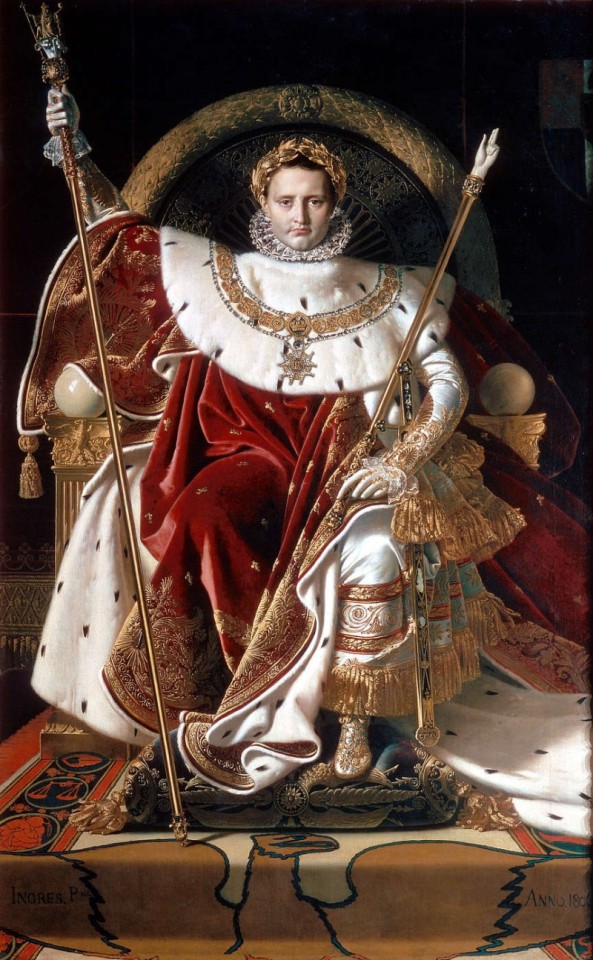
He who laid the groundwork for all liberal thinking. Praise God Emperor of the French Napoleon Bonaparte.
#jokes#but if he suddenly got resurrected#I'd stand with him in a heartbeat#that's some next level divinity#and he was a decent leader for the time#like a liberal empire#and not modern liberalism either#classical liberalism#the real shit#where it's about expanding rights for individuals#rather than giving the state endless amounts of power#not to say Napoleon didnt have endless power#but his reign did give French citizens more rights than they have even now#like natural rights and then some#compared to absolute monarchs
1 note
·
View note
